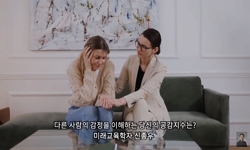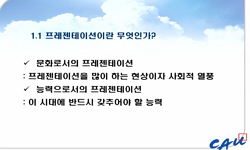심상은 외현적인 감각 자극이나 운동 활동 없이 기억으로부터 표상을 활성화하고 조작하는 능력을 말한다. 공감은 상대방의 관점을 수용하여 감정이나 생각을 정확하게 아는 능력이다. 따...
http://chineseinput.net/에서 pinyin(병음)방식으로 중국어를 변환할 수 있습니다.
변환된 중국어를 복사하여 사용하시면 됩니다.
- 中文 을 입력하시려면 zhongwen을 입력하시고 space를누르시면됩니다.
- 北京 을 입력하시려면 beijing을 입력하시고 space를 누르시면 됩니다.
https://www.riss.kr/link?id=A106447154
- 저자
- 발행기관
- 학술지명
- 권호사항
-
발행연도
2019
-
작성언어
Korean
- 주제어
-
등재정보
KCI등재
-
자료형태
학술저널
-
수록면
1249-1265(17쪽)
-
KCI 피인용횟수
0
- DOI식별코드
- 제공처
- 소장기관
-
0
상세조회 -
0
다운로드
부가정보
국문 초록 (Abstract)
심상은 외현적인 감각 자극이나 운동 활동 없이 기억으로부터 표상을 활성화하고 조작하는 능력을 말한다. 공감은 상대방의 관점을 수용하여 감정이나 생각을 정확하게 아는 능력이다. 따라서 정확한 공감을 위해서는 상대방의 입장을 마음속으로 그려보는 심상작업이 요구될 수 있다. 이에 본 연구에서는 심상작업이 정서적 공감에 영향을 미칠 것이라는 가설을 세우고 실험을 통하여 이를 검증하고자 하였다. 대학생 48명을 대상으로 5가지 정서에 대한 이야기를 들려주고, 실험집단에는 각 이야기의 주요 장면에 대해 그림을 그릴 것이라고 지시를 하고, 통제집단에게는 글로 적을 것이라고 지시하였다. 이들이 이야기를 듣는 동안 EMG를 활용하여 안면 표정 근육의 움직임을 측정하여 이야기에 대한 정서적 공감 정도를 파악하였다. 결과는 심상 작업이 활성화된 집단이 통제집단에 비해 각 정서 점수 총합의 공감 점수가 유의미하게 더 높았다. 하지만 5가지 세부 정서 영역에서는 실험집단이 통제집단에 비해 점수가 높은 경향성은 있었지만 유의미한 차이는 없었다. 본 연구의 의의는 타인의 상황을 마음으로 그리는 심상작업이 공감에 영향을 미칠 수 있다는 점을 확인한 것이다. 하지만, EMG 보다 내적타당도를 갖춘 공감 측정도구가 필요하다는 제한점이 있다.
다국어 초록 (Multilingual Abstract)
Mental imagery refers to the ability to activate and manipulate representations from memory without external sensory stimuli or physical activity. Empathy is the ability to understand and accept another person’s perspective, feelings, or thoughts. E...
Mental imagery refers to the ability to activate and manipulate representations from memory without external sensory stimuli or physical activity. Empathy is the ability to understand and accept another person’s perspective, feelings, or thoughts. Empathy requires the ability to imagine the perspectives or situations of others. This study aimed to test the hypothesis that mental imagery effects empathy. Forty-eight college students were presented with information about five emotions. The experimental group was instructed to draw a picture while listening to a story intended to evoke empathy and the control group was instructed to recall the text of the story once it had ended. While subjects listened to the story, their facial muscle movements were measured by EMG. The results indicated a significant difference in total empathic score between the experimental and control groups. However, there was no significant difference between the groups in the five emotional sub-domains. The implications and limitations of the study are discussed.
참고문헌 (Reference)
1 김경희, "항암 화학치료 환자에게 적용한 심상 프로그램의 효과" 14 (14): 195-202, 2005
2 최해연, "한국인의 정서 구조와 측정" 한국사회및성격심리학회 30 (30): 89-114, 2016
3 문은옥, "품행문제 청소년의 공감손상: 인지공감의 손상인가 정서공감의 손상인가?" 한국심리학회 산하 한국발달심리학회 27 (27): 127-146, 2014
4 권명화, "장기간 훈련에 따른 운동심상 관련 뇌영역의 활성화 및 심상능력 변화" 경북대학교 대학원 2011
5 권영균, "요가와 심상훈련 프로그램이 대학운동선수의 스포츠 심리기술에 미치는 영향" 한국체육과학회 22 (22): 547-562, 2013
6 김혜리, "얼굴표정 자극에 대한 아동의 안면모방과 정서공감간의 관계" 한국인지및생물심리학회 24 (24): 433-452, 2012
7 Ekman, "얼굴의 심리학: 우리는 어떻게 감정을 드러내는가?" 바다출판사 2006
8 김세건, "얼굴 표정의 기본 정서 차원에 대한 기초 연구" 228-, 2016
9 김혜리, "아동의 인지적·정서적 공감 능력과 사회적 행동 간의 관계" 한국심리학회 산하 한국발달심리학회 26 (26): 255-275, 2013
10 성은현, "심상적 사고를 통한 창의력 증진 프로그램 개발 및 효과 검증" 14 (14): 161-180, 2001
1 김경희, "항암 화학치료 환자에게 적용한 심상 프로그램의 효과" 14 (14): 195-202, 2005
2 최해연, "한국인의 정서 구조와 측정" 한국사회및성격심리학회 30 (30): 89-114, 2016
3 문은옥, "품행문제 청소년의 공감손상: 인지공감의 손상인가 정서공감의 손상인가?" 한국심리학회 산하 한국발달심리학회 27 (27): 127-146, 2014
4 권명화, "장기간 훈련에 따른 운동심상 관련 뇌영역의 활성화 및 심상능력 변화" 경북대학교 대학원 2011
5 권영균, "요가와 심상훈련 프로그램이 대학운동선수의 스포츠 심리기술에 미치는 영향" 한국체육과학회 22 (22): 547-562, 2013
6 김혜리, "얼굴표정 자극에 대한 아동의 안면모방과 정서공감간의 관계" 한국인지및생물심리학회 24 (24): 433-452, 2012
7 Ekman, "얼굴의 심리학: 우리는 어떻게 감정을 드러내는가?" 바다출판사 2006
8 김세건, "얼굴 표정의 기본 정서 차원에 대한 기초 연구" 228-, 2016
9 김혜리, "아동의 인지적·정서적 공감 능력과 사회적 행동 간의 관계" 한국심리학회 산하 한국발달심리학회 26 (26): 255-275, 2013
10 성은현, "심상적 사고를 통한 창의력 증진 프로그램 개발 및 효과 검증" 14 (14): 161-180, 2001
11 김기창, "성별에 따른 조현병 환자의 공감 능력 및 얼굴 정서 인식 능력의 차이" 대한생물정신의학회 21 (21): 21-27, 2014
12 김은하, "상담학에서 공감 연구에 대한 고찰: 국내 주요 상담학술지를 중심으로" 한국상담학회 14 (14): 2851-2867, 2013
13 송은섭, "사격선수들의 심리훈련프로그램 적용에 따른 경쟁상태불안, 심상유형 및 심리기술과의 관계" 한국체육과학회 21 (21): 503-516, 2012
14 김혜리, "또래괴롭힘 참여역할에 따른 인지적·정서적 공감의 차이" 한국심리학회 산하 한국발달심리학회 26 (26): 1-20, 2013
15 최현숙, "다양한 인종의 얼굴표정에 대한 정서인식: 초등학생과 대학생 집단의 비교" 한국심리학회 산하 한국발달심리학회 27 (27): 19-31, 2014
16 김윤희, "공감훈련 프로그램의 효과에 대한 메타분석" 한국상담학회 16 (16): 1-21, 2015
17 박성희, "공감학" 학지사 2004
18 Bauer, J., "Warum ich fühle was du fühlst" Hoffmann und Campe 2005
19 Mast, F. W., "Visual mental images can be ambiguous: Insights from individual differences in spatial transformation abilities" 86 (86): 57-70, 2002
20 Kosslyn, S. M., "Visual images preserve metric spatial information: Ecidence from Studies of Image Scanning" 4 (4): 47-60, 1978
21 Kosslyn, S. M., "Visual cognition: An invitation to cognitive science 2" 267-296, 1995
22 Tuyn, L. K., "Using guided imagery exercise in the classroom" 33 (33): 157-158, 1994
23 Truax, C. B., "Toward effective counselling and psychotherapy: Training and practice" Aldine publishing company 1967
24 Pankespp, J., "Toward a general psychobiological theory of emotions" 5 : 407-467, 1982
25 Montgomery, K. J., "The well-tempered social brain" 20 : 1211-1213, 2009
26 Baron-Cohen, S., "The systemizing quotient: an investigation of adults with asperger syndrome or high-functioning autism, and normal sex differences" 358 : 361-374, 2003
27 Kim, S.-E., "The neural mechanism of imagining facial affective expression" 1145 : 128-137, 2007
28 Rizzolatti, G., "The functional role of the parieto-frontal mirror circuit interpretations and misinterpretations" 11 : 264-274, 2010
29 Barrett-Lennard, G. T., "The empathy cycle: Refinement of a nuclear concept" 28 (28): 91-100, 1981
30 Holmes, E. A., "The causal effect of mental imagery on emotion assessed using picture-word cues" 8 (8): 395-409, 2008
31 Izard, C. E., "The Psychology of facial expression" Cambridge University Press 1997
32 Blair, R. J. R., "Responding to the emotions of others: Dissociating forms of empathy through the study of typical and psychiatric populations" 14 (14): 698-718, 2005
33 Dimberg, U., "Rapid facial reactions to different emotionally relevant stimuli" 39 : 39-45, 1998
34 Kosslyn, S. M., "Neural foundations of imagery" 2 (2): 635-642, 2001
35 Kosslyn, S. M., "Neural effects of visualizing and perceiving aversive stimuli: a PET investigation" 7 (7): 1569-1576, 1996
36 Kosslyn, S. M., "Mental images and the brain" 22 : 333-347, 2005
37 Suess, F., "Mental imagery of emotions: Electro physiological evidence" 114 : 147-157, 2015
38 Lang, P. J., "Looking at pictures: Affective, facial, visceral, and behavioral reactions" 30 (30): 261-273, 1993
39 Murphy, S. M., "Imagery interventions in sport" 26 : 489-494, 1994
40 Kosslyn, S. M., "Image and mind" Harvard University Press 1980
41 Kohler, E., "Hearing sounds, understanding actions: action representation in mirrorneurons" 2002
42 Ekman, P., "Handbook of cognition and emotion, 98" 45-60, 1999
43 Feuerstein, R., "Feuerstein instrumental enrichment basic" ICELP 2003
44 Mathews, A., "Feels like the real thing: Imagery is both more realistic and emotional than verbal thought" 27 (27): 217-229, 2013
45 Preston, S. D., "Empathy: Its Ultimate and Proximate Bases" 25 (25): 1-72, 2002
46 Eisenberg, N., "Empathy: Conceptualization, measurement, and relation to prosocial behavior" 14 : 131-149, 1990
47 Basch, M. F., "Empathic understanding: A review of the concept and some theoretical considerations" 31 : 101-126, 1983
48 Sonnby-Borgstrom, M., "Emotional empathy as related to mimicry reactions at different levels of information processing" 27 : 3-23, 2003
49 Sonnby-Borgstrőm, M., "Emotional empathy as related to mimicry reactions at different levels of information processing" 27 : 3-23, 2003
50 Hartfield, E., "Emotional contagion" Cambridge University Press 1994
51 Deschamps, P. K. H., "Electromyographic responses to emotional facial expressions in 6-7year olds: A feasibility study" 85 (85): 195-199, 2012
52 Ricciardi E., "Do we really need vision? How blind people “see” the actions of others" 29 : 9719-9724, 2009
53 Rogers, C. R., "Client-centered therapy" Constable 1951
54 Borke, A., "Chandler and greenspan's ersatz egocentrism" 7 : 107-109, 1972
55 Tomkins, S., "Approaches to emotion" Erlbaum 1984
56 Bryant, B., "An index of empathy for children and adolescents" 53 : 413-425, 1982
57 Brewin, C, R., "A dual representation theory of posttraumatic stress disorder" 103 (103): 670-686, 1996
58 Ehlers, A., "A cognitive model of posttraumatic stress disorder" 38 (38): 319-345, 2000
동일학술지(권/호) 다른 논문
-
상담전공대학원생을 위한 다문화 상담 교과 과정개발 연구
- 한국상담심리학회
- 김은하
- 2019
- KCI등재
-
동성애자 내담자의 상담경험에 대한 질적 연구: 여성 동성애자를 중심으로
- 한국상담심리학회
- 박정은
- 2019
- KCI등재
-
- 한국상담심리학회
- 조현주
- 2019
- KCI등재
-
구직자의 스트레스와 우울 간 관계에서 속박감의 매개효과와 파국화 및 자기비난의 조절효과
- 한국상담심리학회
- 이은정
- 2019
- KCI등재
분석정보
인용정보 인용지수 설명보기
학술지 이력
| 연월일 | 이력구분 | 이력상세 | 등재구분 |
|---|---|---|---|
| 2026 | 평가예정 | 재인증평가 신청대상 (재인증) | |
| 2020-01-01 | 평가 | 등재학술지 유지 (재인증) |  |
| 2017-01-01 | 평가 | 등재학술지 유지 (계속평가) |  |
| 2013-01-01 | 평가 | 등재학술지 유지 (등재유지) |  |
| 2010-01-01 | 평가 | 등재학술지 유지 (등재유지) |  |
| 2008-01-01 | 평가 | 등재학술지 유지 (등재유지) |  |
| 2006-06-07 | 학술지등록 | 한글명 : 한국심리학회지: 상담 및 심리치료외국어명 : Korean Journal Of Counseling And Psychotherapy |  |
| 2006-01-01 | 평가 | 등재학술지 유지 (등재유지) |  |
| 2003-01-01 | 평가 | 등재학술지 선정 (등재후보2차) |  |
| 2002-01-01 | 평가 | 등재후보 1차 PASS (등재후보1차) |  |
| 2000-07-01 | 평가 | 등재후보학술지 선정 (신규평가) |  |
학술지 인용정보
| 기준연도 | WOS-KCI 통합IF(2년) | KCIF(2년) | KCIF(3년) |
|---|---|---|---|
| 2016 | 2.32 | 2.32 | 2.3 |
| KCIF(4년) | KCIF(5년) | 중심성지수(3년) | 즉시성지수 |
| 2.39 | 2.58 | 3.685 | 0.35 |





 KCI
KCI







